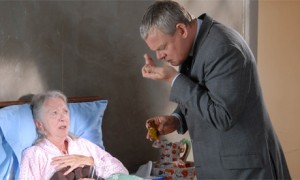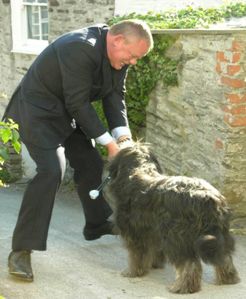 Before me, post card perfect, is a snug little harbor cut into hills and cliffs. I can hear the soothing calls of sea gulls and terns and see a few fishing boats, for, you see, this is a fishing village—Cornish coast, the Atlantic Ocean and all that. There’s a small beach, sufficient, though, for this English village of less than a thousand souls and scene of that woman who absentmindedly wandered into the surf. Her son thought she was suffering from dementia; the local GP had ruled that out, and correctly so, but he had overlooked the real cause of her behavior—vitamin deficiency or something, as I remember.
Before me, post card perfect, is a snug little harbor cut into hills and cliffs. I can hear the soothing calls of sea gulls and terns and see a few fishing boats, for, you see, this is a fishing village—Cornish coast, the Atlantic Ocean and all that. There’s a small beach, sufficient, though, for this English village of less than a thousand souls and scene of that woman who absentmindedly wandered into the surf. Her son thought she was suffering from dementia; the local GP had ruled that out, and correctly so, but he had overlooked the real cause of her behavior—vitamin deficiency or something, as I remember.
Here I am, sitting on the veranda of Bert Large and his son’s restaurant . . . you see, Bert and Al were first plumbers of sorts (still are, really), not particularly an appetizing crossover to restaurateurs . . . but, as I was saying, I’m gazing down on the nearly still water—a soft sunset is reflected on the ripples—and wishing you were here . . . no, seriously, I wish you were here. With proclivities for a particular brand of humor, you’d surely enjoy this place.
 And where is this “here”? Didn’t I say? Oh, Portwenn, of course. Sometimes spelled “Port Wenn.” I could be in any number of places in Portwenn and still see the harbor—the school house, much of the town center and, certainly, the doorstep of the surgery office. Just as there’s only one constable in Portwenn, one chemist and one each of many other things, there’s only one surgeon, er, doctor. See, he was a surgeon, in London I understand, but because of a blood fetish, he abandoned what was supposedly a promising career and came here as a mere GP.
And where is this “here”? Didn’t I say? Oh, Portwenn, of course. Sometimes spelled “Port Wenn.” I could be in any number of places in Portwenn and still see the harbor—the school house, much of the town center and, certainly, the doorstep of the surgery office. Just as there’s only one constable in Portwenn, one chemist and one each of many other things, there’s only one surgeon, er, doctor. See, he was a surgeon, in London I understand, but because of a blood fetish, he abandoned what was supposedly a promising career and came here as a mere GP.
You see, I don’t really live here. I watch—religiously, fanatically—that British comedy series Doc Martin, which is filmed on the Cornish coast, at Port Isaac actually. The show is something of a smash in its homeland, but in the States it’s limited to broadcasts by only a few PBS channels. And, of course, the U.S. is a season or two behind the Brits. Even though my local PBS station shows the same episodes over and over, I enjoy the repeats almost as much as the premières. The U.S. third season has just started, so you can imagine my excitement.
Doc Martin is the creation of screenwriter Dominic Minghella, brother of the late Anthony Minghella who scripted The Talented Mr. Ripley and The English Patient. The characters are essentially exaggerations, the situations often preposterous, the coincidences unrealistic (people are forever running into each other) and the medical emergency overload is absurd—two or three an episode. But, hey, it’s fun, the characters are a delight and the scenery is beautiful.
 That one surgeon, er, doctor, I mentioned is Martin Ellingham (Martin Clunes). He has the bedside manner of most doctors—only ten times worse and an equally alienating relationship with friends and relatives. Did I say “friends”? Better make that “acquaintances.” Maybe besides the schoolmarm—more about her later—his only real friend is his Aunt Joan (Stephanie Cole with a much nicer persona than in Waiting for God). Even for the good-hearted Aunt Joan it’s something of a challenge to tolerate her nephew, much less to understand him. She might be the most “normal” citizen of Portwenn, which is saying a great deal.
That one surgeon, er, doctor, I mentioned is Martin Ellingham (Martin Clunes). He has the bedside manner of most doctors—only ten times worse and an equally alienating relationship with friends and relatives. Did I say “friends”? Better make that “acquaintances.” Maybe besides the schoolmarm—more about her later—his only real friend is his Aunt Joan (Stephanie Cole with a much nicer persona than in Waiting for God). Even for the good-hearted Aunt Joan it’s something of a challenge to tolerate her nephew, much less to understand him. She might be the most “normal” citizen of Portwenn, which is saying a great deal.
Ellingham, who is often bumping his head on the low door frame of his tiny examining room, which he Britishly refers to as “surgery,” tells it like it is—and then some. Testing a man’s heart, Bert Large’s (Ian McNeice) in fact, he screams (quoted as best I remember), “Do you want me to find out what’s wrong with you or do you want to keep on talking until you die?” To a woman negligent in taking her medicine: “If you hadn’t been so stupid you’d be all right now!” And when a consultation is over, what more succinct way to signal it: “Now get out!” No, seriously, this is his manner. You should have a doctor like this—maybe you do.
Oh, sure, he’s tried to lay on the compliments and the small talk, but they seem so alien to him that after a few days—or was it hours?—he gave up. “Why must I say things I don’t mean, be someone I’m not and mouth imbecilities?” He has my sympathy about the small talk . . . ugh!
 Although with my view from the restaurant Portwenn may seem like the English Brigadoon, a sanctuary from unhappiness and disease, the village has more than its share of eccentrics, characters quite at home in Sleepy Hollow or P.G. Wodehouse. At the extremes, there’s the man who heard electronic messages in his head and another who dressed as his dead wife. The worst person so far—the series has been renewed for the U.K. 2011 season—is that creepy, stone-faced woman, Janet Sawle (Irene Sutcliffe), who deprives her sister of the crucial pills prescribed by Doc Martin and substitutes the ineffective ones she concocts in her basement laboratory.
Although with my view from the restaurant Portwenn may seem like the English Brigadoon, a sanctuary from unhappiness and disease, the village has more than its share of eccentrics, characters quite at home in Sleepy Hollow or P.G. Wodehouse. At the extremes, there’s the man who heard electronic messages in his head and another who dressed as his dead wife. The worst person so far—the series has been renewed for the U.K. 2011 season—is that creepy, stone-faced woman, Janet Sawle (Irene Sutcliffe), who deprives her sister of the crucial pills prescribed by Doc Martin and substitutes the ineffective ones she concocts in her basement laboratory.
Most of the village citizens, however, are harmless, their peculiarities most often explained by medical conditions. Doc’s bubbly receptionist, Pauline (Katherine Parkinson), dresses like a gypsy and is quite attractive, a rival in that department to the schoolmarm. Pauline is often spaced out and always gambling on the office computer—switched off in a flash when Doc appears—but, to her credit, she seems to like her boss despite his reliable rudeness toward her and blissfully tolerates old grumpy. (Trouble is, her speech is hard to understand, not because of her English accent but, I think, because she talks with clenched teeth.)
 About that middle school schoolmarm—high time I mentioned her. Louisa Glasson (Caroline Catz) has an off-and-on attraction to Doctor Ellingham, just why it’s never made clear, as most viewers sense it’s insane to pursue this man. Could be it’s his super heroic feats of life-saving—bringing to a man unconscious from a Viagra overdose, reviving women from heart attacks and diabetic faints and operating on a dying boy in an ambulance.
About that middle school schoolmarm—high time I mentioned her. Louisa Glasson (Caroline Catz) has an off-and-on attraction to Doctor Ellingham, just why it’s never made clear, as most viewers sense it’s insane to pursue this man. Could be it’s his super heroic feats of life-saving—bringing to a man unconscious from a Viagra overdose, reviving women from heart attacks and diabetic faints and operating on a dying boy in an ambulance.
Doc has ruined at least two dates with Louisa, first by suggesting an appropriate mouth wash for her bad breath and later by explaining the body chemistry behind her in-progress monthly period—which he detects just from a kiss under a tree. In this same “professional” manner, he delivers one of the funniest lines in the entire series. He is sitting on the bed beside her and lays his hand on hers. Amazed, she’s wondering if this is the big moment. “Louisa,” he says, “I need a stool sample.” It’s the spunky lines, the rapid repartee between individuals, not pace-slowing monologues, that are at the heart of the appeal of Doc Martin.
Then there’s Mrs. Tishell (Selina Cadell), the village chemist who constantly wears a neck brace and isn’t above making medical diagnoses on her own, even anticipating Martin when he’s with a patient. Martin, never patient with his patients, had insisted the brace was a psychotic crutch, but when she finally removed it—what was it, several episodes later?—there was a medical problem.
 Portwenn’s first and only police constable—now here’s a guy you’d like, a little insecure perhaps, but friendly and likeable. Mark Mylow (Stewart Wright) is conscientious in his job, too. Although there’s his dalliance with the girl who wants a father for her unborn child, I prefer the episode where he takes Al Large (Joe Absolom) camping, disastrously proving he knows little about the great outdoors. In setting up his flaunted “base camp,” he is bitten by a poisonous snake. Al has kept his cell phone despite Mark’s order to leave it behind and contacts Doc, who manages to find Mark. Martin has help from a man whose friend is a six-foot squirrel. Er, he, perhaps, is another story—and he does appear in a previous episode. . . .
Portwenn’s first and only police constable—now here’s a guy you’d like, a little insecure perhaps, but friendly and likeable. Mark Mylow (Stewart Wright) is conscientious in his job, too. Although there’s his dalliance with the girl who wants a father for her unborn child, I prefer the episode where he takes Al Large (Joe Absolom) camping, disastrously proving he knows little about the great outdoors. In setting up his flaunted “base camp,” he is bitten by a poisonous snake. Al has kept his cell phone despite Mark’s order to leave it behind and contacts Doc, who manages to find Mark. Martin has help from a man whose friend is a six-foot squirrel. Er, he, perhaps, is another story—and he does appear in a previous episode. . . .
Absolutely the most delightful series I’ve ever seen. Never a dull moment. Always entertaining. I want more!!
I Googled asking about the name of episode where the Doc’s dishwasher makes everyone ill. This reviewer describes it but does not give its name / title. He does for every other episode but not the only one I want.